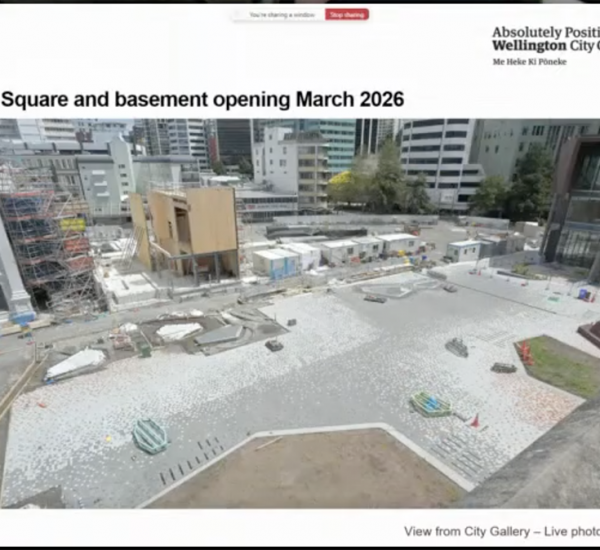This is not good. Last week it was Matrix – this week it is Ebert. Before that we had the harrowing of Hawkins, and earlier on we had Fletcher’s famous faceplant. It’s not a nice thing to watch – a construction sector taking a bath. Too early to tell, of course, but is this a trend that is going to continue to get worse?

Actually, I think not. There’s a common connection between all these construction companies, and that is financial mismanagement and directorial incompetence. Matrix – not the most savvy of builders, but it sounds as though they have been stymied by Building Consent shenanigans. Ebert – I worked with them years ago, and they were a bit shaky even back then, not the most organised of building contractors. Fletchers, famously, screwed up royally by sacking all their older, experienced staff, and hired some new kids on the block. Not surprisingly, some of their jobs went over budget as a result, but with the sum total of their losses well over a billion, it is more surprising that they are still standing. Hawkins? I thought that at least Hawkins was of a better calibre than that, but I was wrong. And of course there is also Mainzeal from a few years ago – which we really never heard enough about: directors including an ex-Prime Minister, people just bleeding the company dry.
Hold on: there’s an even more massive thing that connects them: the overgrown volcanic village that is Auckland. The Auckland construction market appears to be a key factor in what is driving these companies to the wall, as well as the Auckland Council. Projects we have worked on with Auckland Council lately certainly do not seem to show that efficiencies were brought in as part of the super-city reorganisation. It’s not like we have better staff processing more Building Consents more efficiently. There’s more staff, to be sure, but they just seem to be keen to put more barriers in the way, rather than working to rapidly increase housing numbers.
Indeed, it seems to be the Auckland market that is primarily destroying the construction companies of NZ – in almost all cases, because companies have agreed to a fixed price contract, and then after the trials of Consent have run their course, finding that both materials and workers have considerably increased in price. Razor-thin margins can’t hold up to that pressure. The Herald calls it a “perfect storm”, that much-over-used phrase meaning that it is being attacked from all sides at once. Fletchers, for one, have announced that they are getting out of “vertical construction” for ever, closing down their entire high-rise division. Ebert, alternatively, finding themselves over a hundred million down, have taken the final solution and waved the white flag.
Luckily, in Wellington, the process has been handled orderly. One of our correspondents, who happens to have been working on an Ebert site, said that all subs got their tools back and were off site by 1.30 yesterday. In Auckland – not so lucky.




It is really sad to see this sort of thing happening in a time when there is still plenty of work around. Seeing this number of well established companies struggle may be as much a sign of inability to change with the market as it is of the every thinner margins in the tender market. Who knows outside of the governing bodies of these firms? With the collapse of larger companies comes significant personal stress to many affected people, many of whom will be affected despite having done great work and running their own businesses well. It’s tough out there and my heart goes out to those who are affected and can least afford to be.
Thanks Denny – yes, and there is recognition that there could be more on the way.
https://www.stuff.co.nz/business/105976500/more-businesses-may-fail-in-most-dangerous-time-for-construction
“There may be more casualties as the under-pressure New Zealand construction industry battles to keep up with demand.
High-profile failures this year have drawn attention to the “razor-thin margins” that construction companies are working with, and the difficulty they have in making projects pay.
When Ebert went into receivership this week, almost 100 staff were left in the lurch and purchasers of off-the-plan apartment developments, such as Union Green in Auckland, faced being left out of pocket.”
The fixed price contract disease is definitely a thing
I heard Scarbro had a bunch of major changes to their build (old Shell House) that were never on the original plans, for example
In Ebert’s case there were other factors. In no particular order or magnitude
1 The Auckland thing – we have to mollycoddle our subbies and do everything for them and in AK it is worse- the ratio of ones who just don’t GAF or turn up at all is that much higher.Why bother when there is screeds of work everywhere? you can say you’ll do it and do what you like
2 The English super-subbie culture – apparently there are more guys like Formco and Wallace over there that will do the whole job for you (within reason) and you just have to make sure that they have the latest set of plans. Not the case in NZ but the poms don’t get that sometimes
3 The 90’s/early 00’s lack of apprentices – There is an empty cohort roughly aged 30 to 40 where the people weren’t trained in the mid 90’s squeeze so there are more kiddies running jobs and signing up for contracts that they don’t fully understand which ends up biting the company in the arse
It isn’t unusual to stand up on the slab and see a few guys in their 50’s and a whole bunch of twentysomethings
Other factors contributed to the demise of Ebert but these were not highlighted in the MSM’s soundbite-era desire to label Fixed Price Contracts as the new bugbear
In the wider industry you also have
1 Greater specialisation within the industry – In the 70s and 80s it wasn’t unusual to have 5 or 6 trades max build a house, now it can go up above 20
The builder that did their own roofing and laid their own concrete had more skin in the game – they may have had less expertise being a jack of all but at the other end, if all you do is install kitchen vents then you’re not going to get the bigger picture..
2 Greater technical responsibility being foisted on to builders and hand in hand with that
3 More weaselling out of responsibility eg Resene saying that you have to paint in a dust-free environment to get a guarantee; a certain litigous cement-board manufacturer changing their installation specs yearly, we can all think of examples
4 More crap exterior envelope design ie a house with what looks like 150 different roof surfaces -at least this one I see is starting to be addressed
5 Very few prosecutions for fraud – A QS jacks up a deal with a subbie and strips 100k out of a company before he gets found out – He’s gone but no prosecution. If enough greedy people think they can get away with something then they will try it on
Solutions?
1 Financially penalise designers/engineers who constantly change plans through beefing up Notice of Delay clauses
2 Invest in research to digitise plans be it through BIM or some sort of phone app linked through GPS to the plans – once the roof is on it is simple enough to triangulate through cheap wifi transmitters and use your phone to know which layer of the plan you are looking at – Get the people who made Pokemon Go onto it – the tech is already there we just need it to be put together
Paper plans in the year 2018? Wtf?
3 Standardised tested premade building units – imagine a window that was to a standard size and pre-flashed to a BRANZ approved level that would come in a container from China and could be lifted into the timber frame by two people?
Why make alum windows from scratch out of extrusions to custom fit individual buildings? Want to take a door/window budget for a house down from $20k plus to less than half that?
Leave the bespoke houses to the rich – most people wouldn’t mind if there were only a dozen standard window sizes available if they cost bugger all compared to now
NZ does bespoke housing and we don’t do it that well
End of rant I’m drinking now..
Epic comment, thanks 60 – I suspect you deserve a stiff drink after the events of this week. There’s so much in there to comment on – totally agree with your list of solutions for a start. You’ve obviously been at the coal face of it more than me – but your number 2 point is a great idea. I thought that would have happened by now as well. Every builder should be able to pull up plans on a tablet, anywhere roaming around the job, and get the latest information.